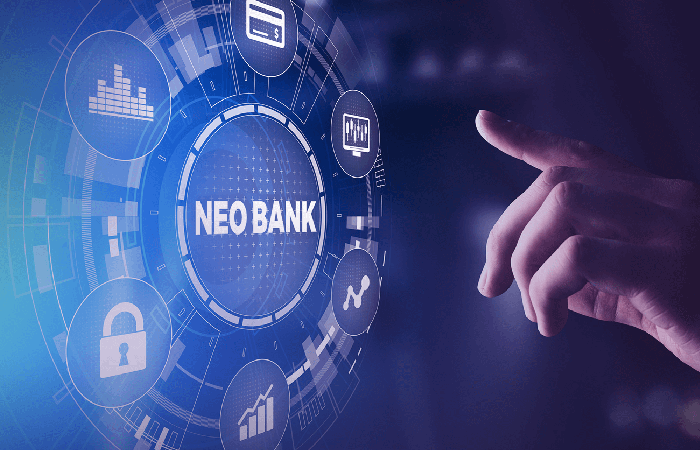The Rise of Smart Banking: How Neobanks are Redefining Financial Services with AI and Embedded Finance
Discover how neobanks are revolutionizing financial services with AI and embedded finance. Learn how these technologies personalize banking, enhance security, and create seamless financial experiences.

Technology breakthroughs and changing consumer demands are driving a rapid shift in the banking sector. Neobanks, digital-first financial institutions that use advanced technologies like embedded finance and artificial intelligence (AI) to transform how we deal with our money, are at the vanguard of this transition. This article examines the emergence of "smart banking" and the ways in which neobanks are ushering in a new era of integrated, frictionless, and customized financial services.
From Traditional Banking to Smart Banking
With its physical branches and laborious procedures, traditional banking finds it difficult to meet the needs of today's tech-savvy customers. Neobanks have taken advantage of this void by providing simplified services, reduced costs, and intuitive mobile apps.
Neobanks only operate online. But what really distinguishes them is their adoption of embedded finance and artificial intelligence, which are fueling the rise of "smart banking."
The Power of AI in Neobanking
AI is revolutionizing various aspects of neobanking, including:
-
Personalized Financial Management: In order to provide individualized budgeting tools, savings recommendations, and financial coaching, artificial intelligence (AI) systems analyze vast amounts of user data, including spending patterns, income trends, and financial objectives.
Users are therefore more equipped to meet their financial goals and make wise financial decisions. For instance, AI might evaluate investment opportunities based on customer risk profiles or pinpoint areas of unnecessary spending and suggest cost-cutting strategies. -
Fraud Detection and Security: By spotting odd transaction patterns and suspicious activity, AI-powered systems are able to identify fraudulent activity in real time. This greatly improves security and shields users from monetary losses. Machine learning models are very good at thwarting changing threats because they are always learning and adapting to new fraud techniques.
-
Automated Customer Service: Chatbots and virtual assistants driven by AI offer immediate customer service, addressing queries, fixing problems, and assisting users with a variety of banking procedures. This lowers the need for human intervention in repetitive jobs and increases customer satisfaction.
-
Credit Scoring and Lending: Artificial Intelligence (AI) can evaluate alternative data sources, like social media activity and past internet purchases, to determine creditworthiness and grant credit to those who conventional credit scoring algorithms might have rejected. This increases access to financial services and encourages financial inclusion for
underserved populations. -
Integration of cryptocurrencies: A lot of neobanks are adding custody and trading capabilities for cryptocurrencies to their platforms. Users may now manage both their digital assets and traditional finances in one location thanks to this.

Embedded Finance: Banking Beyond the Bank
The integration of financial services into non-financial platforms and ecosystems is known as embedded finance. Leading this movement are neobanks, which collaborate with companies in a range of sectors to provide smooth banking experiences through their current websites and apps. The following are some instances of embedded finance in neobanking:
Buy Now, Pay Later (BNPL) Services: Neobanks frequently provide Buy Now, Pay Later (BNPL) alternatives at the point of sale, enabling clients to finance goods in installments. For retailers, this increases sales and improves the consumer experience.
Integrated Payment Solutions: Neobanks let users to make payments without ever leaving the app by integrating their payment systems into ride-hailing applications, e-commerce platforms, and other online services.
Financial Management capabilities in company Platforms: Neobanks offers integrated financial management capabilities, including payroll processing, expense monitoring, and invoicing, through partnerships with accounting software vendors and other company platforms.
Users benefit from a more seamless and convenient financial experience because to embedded finance, which dissolves the boundaries between traditional banking and other sectors.
The Neobank Advantage: A Synergistic Approach
When AI and embedded finance work together harmoniously, neobanking's real potential is shown. Neobanks are pushing the boundaries of smart banking by using AI to personalize financial services and integrating them into commonplace platforms. This method has a number of important benefits:

- Improved Customer Experience: When compared to traditional banks, Neobanks offer a more individualized, easy, and convenient banking experience.
- Better Access to Financial Services: AI-driven credit scoring and integrated finance solutions give underprivileged groups more access to financial services.
- Improved Efficiency and Cost Savings: Neobanks are able to provide reduced fees since AI-powered automation lowers operating expenses.
- Data-Driven Insights: AI helps neobanks to continuously enhance their goods and services by offering insightful information about consumer behavior and market trends.
The Future of Smart Banking
Smart banking's ascent is only the beginning. In the neobanking industry, we may anticipate even more creative uses of AI and integrated finance as technology develops. Future developments could include the following:
Hyper-Personalization: Neobanks will provide highly customized products and services based on the needs and preferences of each individual customer, thanks to AI's ability to further personalize financial services.
Proactive Financial Management: AI will proactively provide financial solutions, such as automatic savings plans and customized investment strategies, by anticipating consumer demands.
Integration with Emerging Technologies: To provide even more engaging and dynamic banking experiences, Neobanks is probably going to interface with other cutting-edge technologies like blockchain, virtual reality (VR), and augmented reality (AR).
Increased Collaboration and Partnerships: In order to broaden the use of embedded finance and establish smooth financial ecosystems, Neobanks will keep establishing alliances with companies in a variety of sectors.

FintechZoom and the Neobank Landscape
Platforms like FintechZoom play a crucial role in navigating the complex world of fintech, including neobanks. They provide valuable resources such as:
Neobank comparisons: provides comparative evaluations of several neobanks, emphasizing their features, costs, and client feedback. This gives customers the ability to choose wisely depending on their own requirements.
Industry news and insights: These websites disseminate reports, articles, and analyses about the most recent advancements and trends in the neobanking space. Users are kept up to date on market trends, new regulations, and upcoming technology thanks to this.
Discussion boards and community forums: FintechZoom frequently hosts discussion boards and forums where users may ask questions, share their experiences with various neobanks, and have discussions regarding the direction of digital banking.
Conclusion
Neobanks are leading a financial revolution by utilizing embedded finance and artificial intelligence to usher in a new era of smart banking. They are changing the way we deal with our money and influencing the direction of the financial sector by providing individualized, smooth, and integrated financial experiences.
We may anticipate greater innovation and disruption in the neobanking industry as technology develops, further consolidating the emergence of smart banking as the new standard.




